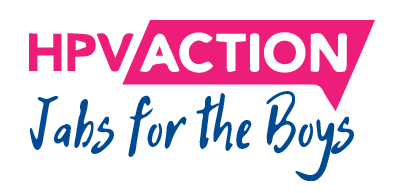Information for boys aged 12-15

The human papillomavirus (HPV) is a virus, a sort of germ, that can cause diseases in several parts of your body.
There are around 200 types of HPV. Many are harmless. But some are dangerous and can cause cancer of the penis, anus, head and neck. Others can cause warts on your penis and anus.
No. HPV is completely different from HIV, the virus that can lead to AIDS.
HPV infection is very common. It is spread by having sex.
You definitely can’t catch the types of HPV that cause cancer or genital warts from toilet seats, hugging, holding hands, swimming pools or hot tubs or sharing food or knives and forks.
Well, nearly everyone who has sex gets HPV at some point in their lives.
Because the infection is so common, many people get it shortly after starting to have sex. You can get HPV from having sex just once or with just one person.
Having HPV definitely does not mean you will automatically get cancer or genital warts. Most people with HPV are unaffected.
But HPV infection can persist in some people and cause problems, sometimes years later.
HPV vaccination is by far the best way of protecting yourself against HPV and the diseases it can cause.
Most people with HPV don’t know they’re infected. There are no symptoms. And they never develop a health problem as a result. For most people, HPV usually goes away on its own.
Condoms on their own reduce the risk but can’t prevent HPV infection completely. This is because HPV can infect parts of the body not covered by a condom and can be passed on without having penetrative sex.
Whether you have the HPV vaccination or not, you should still use a condom if you have sex in order to prevent pregnancy, HIV and a range of other sexually transmitted infections including chlamydia and gonorrhoea.
Cancer
HPV is estimated to cause 5% of all cancers. Doctors who treat cancer have found that HPV can cause cancers of the penis, anus, head and neck in men. About 2,000 men a year in the UK develop a cancer caused by HPV and some of these cancers are becoming more common.
These cancers very rarely affect boys or young men – the vast majority appear when men are middle-aged or older.
In women, cancer doctors have found that HPV can cause cancers of the anus, head, neck, cervix, vagina and vulva. (The cervix is located where a woman’s vagina meets her womb; the vulva are the ‘lips’ surrounding the entrance to the vagina.)
Genital warts
HPV causes warts on the genitals and anus. Around 40,000 men catch genital warts each year in the UK. Genital warts often look like small cauliflowers.
They don’t hurt and won’t kill you. They are not a serious threat to health but they can be unpleasant to look at, make you anxious and affect your sex life.
Recurrent respiratory papillomatosis (RRP)
Doctors treating breathing diseases have found that HPV is the cause of this rare problem. It can affect children as well as adults of both sexes and can be difficult to cure.
No. The types of HPV that cause cancer (types 16 and 18) and the types that cause warts (types 6 and 11) are different. This means that genital warts are not an early-warning sign of cancer and can’t turn into cancer.
Yes you can, but only boys in Year 8 in England and Wales, Year S1 in Scotland and Year 9 in Northern Ireland get vaccinated free of charge on the NHS. From September 2019, both boys and girls will be offered HPV vaccination at school.
If you miss your vaccination in school, you can still get vaccinated free of charge until you are 25. But this doesn’t apply to boys already too old to be offered the jab when HPV vaccination was introduced in the 2019/20 school year.
Boys too old to be vaccinated at school can still be vaccinated privately (which means there is a charge).
These are some of the reasons for having the vaccination:
- Vaccination protects against the most dangerous HPV types that cause cancer and genital warts.
- Vaccination offers protection against HPV infection for at least 10 years and probably for much longer.
- Vaccination works best when a boy is aged under 15. This is because you are highly unlikely to have been in contact with HPV yet and because younger people get more immunity from the vaccination.
- You can’t catch HPV from a woman who has been vaccinated but not all women in the UK have been vaccinated. Young women are most likely to have been vaccinated but about 1 in 7 hasn’t.
- Women from many other countries may also not be vaccinated. For example, about 75% of young French women have not been vaccinated against HPV.
- If you are gay or have sexual contact with other men, you can also get HPV because so few men have been vaccinated.
- Vaccination helps everyone in society – the more people who are protected, the less easily HPV can affect the whole population.
- HPV vaccination is now recommended for boys in over 30 countries including Australia, Austria, Bermuda, Brazil, Canada, Italy, New Zealand, Norway, Switzerland and the USA.
- Vaccination for boys is supported by many health organisations and doctors. A HPV Action of survey of almost 1,700 GPs and dentists found that 95% thought that boys should be vaccinated.
Yes. There are some arguments against vaccination:
- HPV vaccination can sometimes cause side-effects like soreness, swelling and redness in the arm. But the side-effects are almost always mild and don’t last long.
- Although most people have HPV, most HPV infections do not lead to a health problem. Only a small proportion of people with HPV develop cancer or another disease caused by HPV.
- You won’t be exposed to HPV if you have sex with women who have been vaccinated. Most young women who grew up in the UK have now been vaccinated.
- If it is done privately, HPV vaccination for boys is expensive. It costs about £150 per injection. Adolescent boys need two doses; older boys (over 15 years) and men need three doses.
HPV Action believes that all boys should be vaccinated except in rare cases, such as where someone is allergic to the vaccine or any of its ingredients.
Yes. The evidence from many scientific and medical studies is that HPV vaccinations are very safe.
The vaccine gives you a tiny dose of part of an HPV cell which causes your immune system to develop resistance to infection. The vaccine does not contain live organisms and can never cause the diseases it protects against.
You have the injection in your upper arm. (You can choose which arm.) The area will be cleaned with an antiseptic wipe and then a very fine needle will be used for the vaccine. It is very unlikely to hurt; you will probably feel no more than a scratch or a prick. It will all be over in a few seconds.
The most common side effects of the HPV vaccine include swelling, redness and pain at the site of the injection, and headaches.
A much smaller group of people might experience fever, nausea (feeling sick) and painful arms, hands, legs or feet. More rarely still, some people develop an itchy red rash. Very rarely, there may be breathing problems. One person in a million may have a severe allergic reaction.
These problems are not nice but they are treatable by yourself using painkillers or by healthcare staff. They don’t last long and people make a full recovery. The staff who give the vaccines are trained to spot and deal with any allergic reactions.
The small risk of having a side-effect must be balanced against the risk of developing a disease caused by HPV like cancer.
Some parents believe that the HPV vaccination has caused their children to suffer from serious long-term health problems. But there is no good scientific evidence for these claims. Remember that most 12/13 year-old girls in the UK have been vaccinated each year since 2008. It is a very common procedure and for almost all of the girls it hasd been quick, painless and soon forgotten.
You can get it free at school on the NHS from September 2019 if you are in Year 8 in England and Wales, Year S1 in Scotland or Year 9 in Northern Ireland. You can also continue to get it free if you miss the vaccination until you are 25.
If you are aged 15 or under, you will need two injections, with the second ideally between six and 12 months after the first (although it can be given up to 24 months later). The second injection is important as, without it, you will not be fully protected.
Boys too old to have been vaccinated when the programme for boys started in the 2019/20 school year are not being offered the vaccine. These boys can only get the vaccine privately.
Because of the cost (about £150 per jab), you will probably need to ask your parents or guardians to take you to a clinic for the vaccination. Even if you have the money to pay for the vaccination yourself, it is unlikely that a private clinic would be willing to vaccinate someone under 16 without the agreement of their parents or guardians.
HPV vaccination is now provided for boys at two national pharmacy chains: Boots and Superdrug.
The vaccination is also available from some private health centres and travel clinics. An online search along the lines of “Where can I get HPV vaccination privately in [insert nearest town/city] UK” should work.
If you have had sexual contact with someone of the same sex and go to a sexual health clinic (these are also called GUM clinics) for a sexual health problem (such as testing for an infection like chlamydia) you should be offered HPV vaccination free of charge. This applies to boys aged under 16 and, if the doctors think you understand what’s involved, your parents or guardians will not have to be consulted or give consent. Doctors in these clinics can also offer HPV vaccination to transgender people.
The vaccination service for men who have sex with men was set up because they are at greater risk of HPV infection and the diseases it causes.
You could read the other sections on this website, listen to the podcasts or follow the links below.
The NHS has a leaflet about HPV vaccination aimed at young people. You can read it here. There’s also more information on the NHS website.
For more information on head and neck cancers:
- Throat Cancer Foundation
- Mouth Cancer Foundation
- Oral Health Foundation
- Mouth Cancer Awareness Month
- Cancer Research UK
- The Swallows
- Oral Cancer Foundation (USA)
For more information on anal cancer:
For more information on penile cancer:
For more information on genital warts:
For more information on RRP:
For more information on vaccine safety:
Pharmacy chains offering the vaccine to boys:
If you are worried about a relationship you are in, or if the behaviour of an adult or another child is causing you distress, call Childline on 0800 1111.
Share page:

